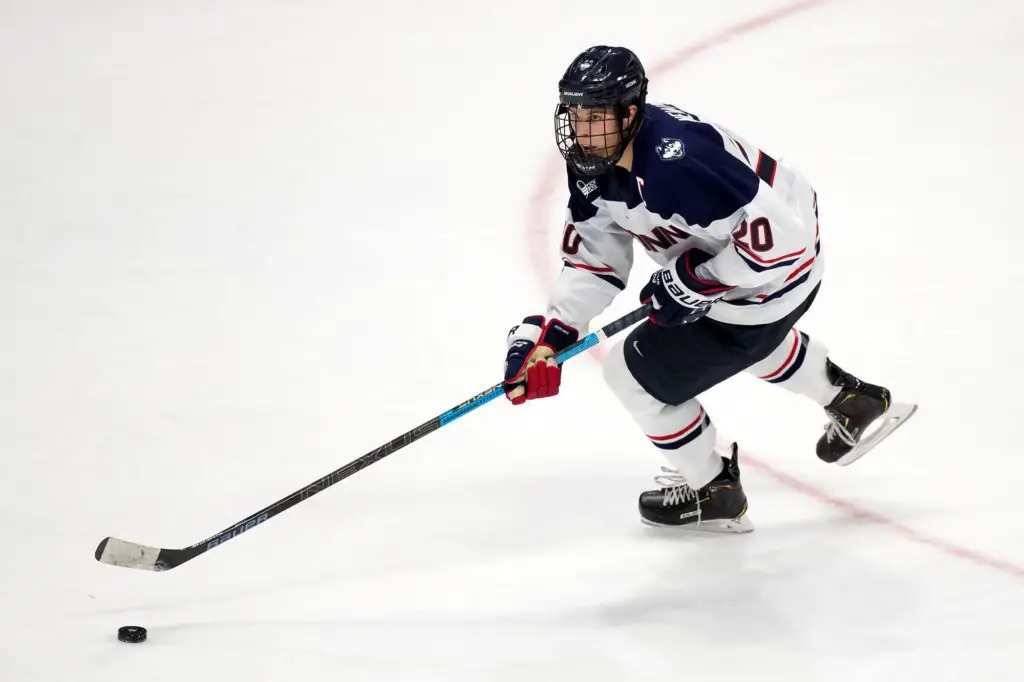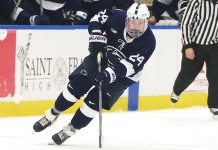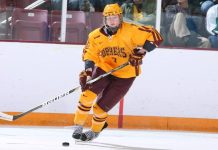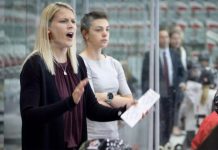
“Don’t get on the bus.”
Those were the words the Connecticut coach Mike Cavanaugh heard on the other end of the phone from his athletic director.
They were also the words that made Cavanaugh realize that his team’s hockey season was over.
UConn had just finished what Cavanaugh said was “one of the best practices of the year” last Thursday morning.
Immediately after practice, the team was packing the bus for the five-hour bus ride north to Orono, Maine, where the Huskies were set to take on the Black Bears in a best-of-three quarterfinal series to open the Hockey East playoffs.
That now seems like a month ago, as in the hours that followed the league announced that the tournament was canceled and, hours later the NCAA made a similar announcement regarding their postseason events.
The coronavirus, or COVID-19, had delivered a crushing blow, one that was unprecedented, onto the world of sports.
For anyone you talk to, the recollection of last week’s events is the same: it happened so fast.
“Wednesday night, there was a lot of text messages going back and forth between the coaches,” recalls Cavanaugh. “Once the NBA canceled [a Wednesday night game], that’s when you kind of knew.”
Hockey East commissioner Joe Bertagna, administering his final of 23 conference tournaments, says the speed of it all makes recreating the timeline difficult.
“I feel like I have to go back and look at a calendar to recreate the dates and the times,” Bertagna said.
According to him, the process began early on Wednesday when the University of Massachusetts system, which accounted for two host sights for the quarterfinal round in Lowell and Amherst, said that they would not allow spectators. Boston College followed suit later that afternoon.
By afternoon’s end, the NCAA followed suit with its regional and Frozen Four tournaments, which certainly raised more antennae around the college hockey community.
“We knew we were going to be responding to situations and events that were bigger than us,” said Bertagna. “When the NCAA went to all empty arenas and the NBA suspended play on Wednesday, that spiked the pace of decision making and reduced options.
“All of a sudden, it wasn’t going to be business as usual. It was going to be empty buildings at the least and hovering over the process was that we’d have to cancel the whole tournament.
“Everything was moving very quickly and we also were in communication with the other conferences. And everyone was arriving at the same conclusions roughly at the same time.”
Bertagna, who himself has two college-aged children, said that hearing more and more about campuses closing, students not returning from break, and other news, made him understand the walls would likely close in on intercollegiate athletics.
“Everything happened so quickly that it was pretty clear that events had overtaken the need to deliberate.”
One major concern for Hockey East and every other league is the financial impact that a tournament cancelation may have. But as Bertanga pointed out, it’s not as dire a situation as one may think.
While tournament ticket sales generally represent about 50 percent of Hockey East’s operating expenses in a given year, not having the tournament also eliminates some of the major expenses associated like travel, accommodations and key staffing such as officials.
“The net loss is not as bad when you look at the revenue,” said Bertagna. “There’s a loss, but single-sport conferences aren’t sharing in NCAA revenue, so we’re pretty much driven by the tournament, number one, but we also have more media revenue (via TV deals with CBS All-Access and NESN) and more sponsorship revenues that we’ve ever had.
“We’ll have all our bills paid through the summer.”
That’s may be a bit of a headache for Steve Metcalf, who will take over the commissioner’s reigns in the coming month. Which brings up the point that for Bertagna and associate commissioner Kathy Wynters, the end of their careers at Hockey East were nowhere near what either of them imagined.
Bertagna said he doesn’t feel as bad about the ending knowing that he was able to visit 10 of the 12 schools prior to season’s end where he was recognized on the ice prior to games. But he wishes that Wynters, who was employed off-and-on (though more “on” than “off”) since the league was created in 1984.
“I feel bad for her,” said Bertagna. “We were planning on dropping the puck together at the Garden and were going to have a brunch for friends [during tournament weekend].”
Back to Cavanaugh and his team, arguably the best team he has coached since arriving at UConn 2013, there is a pained sentiment that is likely felt by just about every one of the coaches around the country.
“It is frustration for our senior class,” said Cavanaugh. “Returners will get a chance to compete in the Hockey East tournament again. Our seniors will not.
“Of all the years that we’ve been in the Hockey East tournament, this was the year we had the chance to go to the Boston Garden.”
An unfitting sendoff for my good friend
My colleague and legendary writer with whom I’ve been allowed to share this column space with for a number of years joined folks like Bertagna and Wynters whose careers hardly had a fitting ending.
Dave Hendrickson told me early on this season that this would be his last. He then announced it a few weeks back in this space and did so in an eloquent way with the perfect words that Dave and his writing have produced for more than two decades for USCHO.
I recall following Dave’s writing in the years after I graduated UMass Lowell and wishing I could be him. He always had the good story angles and seemingly always painted the picture with ease (I’d come to learn once I knew him better that “ease” and writing for Dave usually don’t go together).
In 1999, when I was first hired by USCHO, Dave and I quickly became friends and beginning the following year at the 2000 Frozen Four in Providence, we became roommates at college hockey’s annual championship event. To say that there are some great stories to tell from those few days spent together each season is an understatement.
Most, especially from the early days when we were both a little longer, involved alcohol and long nights with friends were saw but once a year. Some, over time, involved card playing, especially in the mid 2000s when it felt like there was more poker played than hockey at each Frozen Four.
And then there were the memorable games. They always created the best stories.
My favorite, which I’ll share with the readers, occurred in the early years. USCHO’s staff was smaller and everyone was brought to the Frozen Four. Now mind you, when there are seven different writers trying to find unique story angles for features every single game, it can be difficult to find much content that is interesting. And, as Dave always seemed to stress, he wanted to enjoy writing about.
As the first semifinal was grinding along, the game seemed beyond boring. I can’t recall the teams, but I’m going to guess that Minnesota was a participant given the next part of the story.
Dave was looking at the ice during intermission and gawking – or should I say, admiring – Minnesota’s cheerleaders. Then the light bulb went on: “Why write about the hockey players when writing a feature on the Minnesota cheerleaders would be more enjoyable.”
Dave scuttled from the press box down to the concourse level and tracked down a handful of the attractive pom-pom bearing young ladies. Fifteen minutes or so, Dave returned, big smile on his face.
He had his story.
Since those days, we’ve all matured a little bit. Dave’s writing career has changed focus quite a bit as he’s successfully published a number of novels, including a great series for young adults about the impacts of race of sports. That writing has been whimsical at times, prolific at others.
As he focuses on that portion of his life, I want to take the opportunity to wish him the success and happiness. I know that we’ll always remain friends. And when life returns to some semblance of normal in the future, I look forward to raising a glass to celebrate Dave’s career.
And let’s hope, at some point in the not too distance future, Dave again gets the chance to write another story about hockey cheerleaders.


